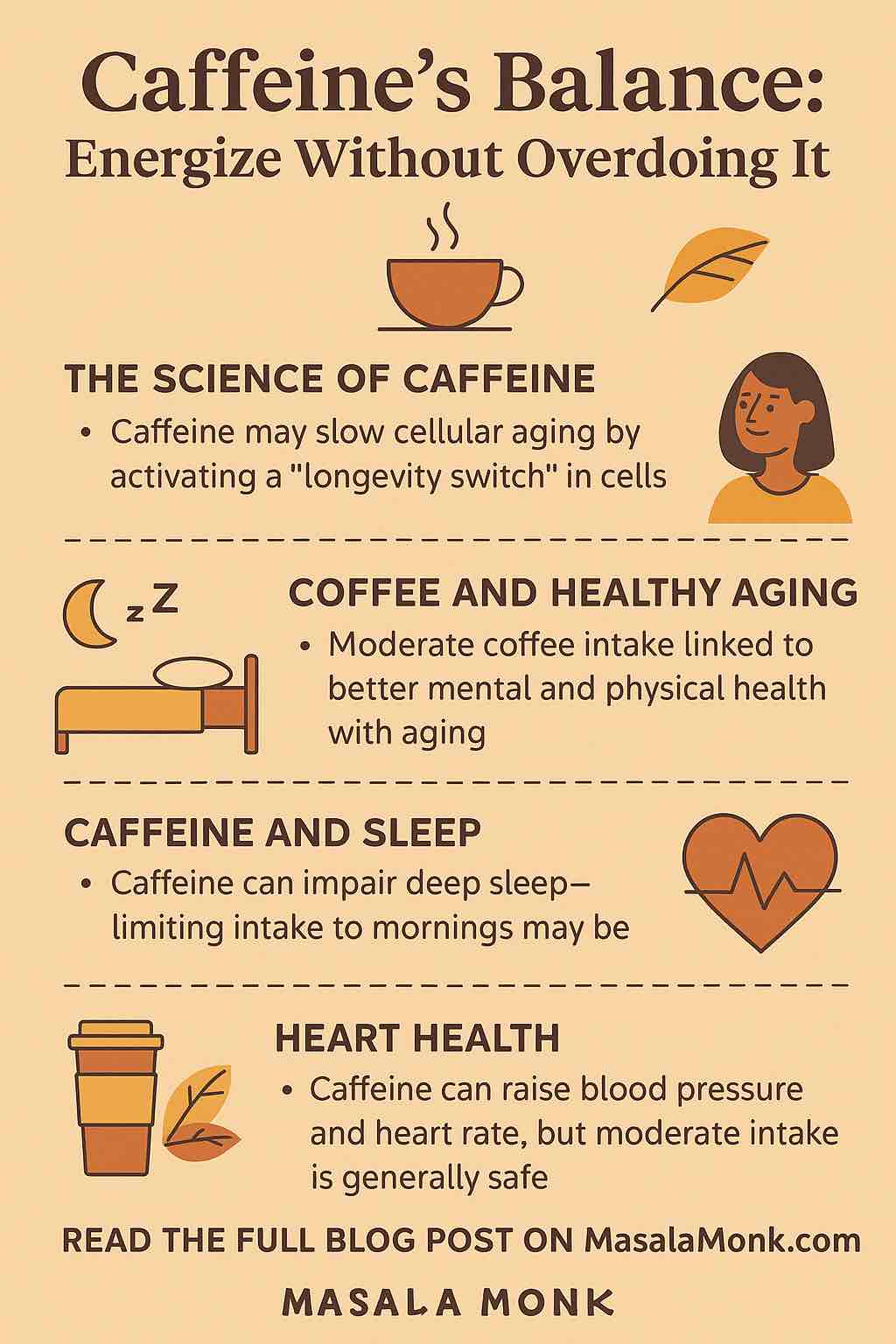
Wake up, brew a cup, and feel the world sharpen. But where’s the line between energized and over-caffeinated? Modern science is offering new insights into how we can harness caffeine for peak energy—while avoiding the pitfalls of too much.
☕️ The Science of Caffeine: What’s New?
Caffeine isn’t just a jolt for sleepy mornings; it’s a molecule with a fascinating impact on our bodies and minds. In 2025, researchers from Queen Mary University of London discovered caffeine triggers a “longevity switch” in cells by activating a system called AMPK, long linked to stress resistance and DNA repair. This could mean your morning brew is doing more than just waking you up—it’s potentially helping your cells fend off aging .
But here’s the twist: Caffeine can sometimes override your body’s natural pause for DNA repair after damage. So, in situations where your cells are under stress or you’re dealing with other health challenges, too much caffeine might work against you.
👩⚕️ Coffee and Healthy Aging: Is It Real?
The buzz isn’t just hype. A 32-year study of nearly 50,000 women found that those who drank around three cups of caffeinated coffee daily (about 315 mg caffeine) in midlife were more likely to age healthily—maintaining sharp minds and strong bodies, and dodging chronic disease. Every additional daily cup (up to five) increased those odds by 2–5% .
Another study in older adults showed coffee drinkers were less likely to become frail as they aged, likely due to coffee’s powerful antioxidants and anti-inflammatory effects.
😴 Caffeine’s Downside: Sleep and Mental Health
Here’s where balance matters. A recent study published in Nature Communications Biology found caffeine—even consumed in the afternoon—can disrupt the quality of deep NREM sleep and memory consolidation. In practical terms: Your 3 pm cup might steal your 11 pm rest. Caffeine’s effects can linger for 8–12 hours, depending on your metabolism and sensitivity.
Sleep scientists and clinicians now urge keeping caffeine to the morning—ideally before noon—to avoid unintended sleep disruption. And it’s not just about bedtime: Even a late-morning dose can affect night owls.
Anxiety and Dependence:
High caffeine can trigger jitters, anxiety, and for those predisposed, even panic or psychotic symptoms. Over half of regular users experience withdrawal—headaches, irritability, fatigue—within a day of stopping. This withdrawal can last a week or more.
💓 Heart Health and Blood Pressure: What to Know
Good news: For most people, moderate caffeine (up to 400 mg/day, about 3–4 cups of coffee) is safe—even for those with mild hypertension. But every cup temporarily raises blood pressure and heart rate. If you already have heart issues or are sensitive, keep an eye on your response.
Interestingly, new studies show that timing matters: People who drink their coffee only in the morning tend to have lower overall mortality and heart risk than those who sip all day long .
🌊 Myths Busted: Caffeine, Hydration, and Hidden Sources
- Coffee does not dehydrate you. The mild diuretic effect is offset by the fluid in your cup.
- Hidden caffeine is everywhere: Tea, chocolate, energy drinks, pre-workouts, even “decaf” coffee (which still contains a little). Some over-the-counter painkillers, colas, and even certain flavored waters can sneakily add to your daily tally.
🚦 How Much is “Too Much”? Personalizing Your Limit
- Most adults: Up to 400 mg per day is considered safe. That’s 3–4 small coffees or up to 8 cups of strong tea.
- Pregnant women: Should stay under 200 mg.
- Children, teens, and those with anxiety, sleep issues, or heart conditions: Less is better. Listen to your body!
Everyone’s metabolism is different. Some people feel jittery after a single espresso, while others can sleep after a triple shot. Genetics, body weight, medications, and even hormonal cycles all play a role.
✅ Practical Tips: How to Get the Best from Caffeine
1. Time it right:
- Drink caffeine early—ideally before noon.
- If you need an afternoon boost, try a brisk walk or power nap instead.
2. Track your intake:
- Write down every source for a week. You might be surprised where caffeine is hiding!
3. Stay below 400 mg/day (unless otherwise advised):
- Example:
- Brewed coffee (8 oz): 80–120 mg
- Black tea (8 oz): 40–70 mg
- Espresso shot: 60–80 mg
- Cola (12 oz): 30–50 mg
4. Go black:
- Coffee’s benefits are best in its pure form—skip the heavy creams and sugars, which can add calories and mask benefits.
5. Watch your body’s signals:
- Signs you’re overdoing it: racing heart, anxiety, insomnia, stomach upset, headaches.
6. Taper off gradually:
- If you want to cut back, reduce by half a cup every few days to avoid withdrawal.
7. Explore alternatives:
- Green tea and matcha give gentler, longer-lasting energy and extra antioxidants.
- Herbal teas are a great caffeine-free ritual.
🧠 Pro Tips: For the Real Caffeine Aficionado
- Try intermittent caffeine breaks:
Give your body a weekend off, or skip every third day, to maintain sensitivity and avoid tolerance. - Experiment with timing:
If you work out, try caffeine 30–60 minutes before for a performance boost. - Mind your medications:
Some antibiotics, antidepressants, and even birth control pills slow caffeine metabolism. Ask your doctor if you’re not sure.
🎯 Key Takeaways: Caffeine as Your Ally
Caffeine can absolutely be part of a healthy, productive, and even longer life—if you use it wisely. Think of it like a tool: valuable when you know what you’re doing, risky if you don’t. With smart timing, self-awareness, and moderation, you can energize your days, support your health, and avoid the downside.
So tomorrow morning, as you savor that first cup, you can enjoy it as a science-backed boost—and know you’re in control.
Ready to fine-tune your caffeine routine? Try tracking your habits for a week and see what you discover. Questions, tips, or favorite hacks? Share them in the comments below!
FAQs
1. How much caffeine is considered safe for most adults?
Most healthy adults can safely consume up to 400 mg of caffeine per day, which is roughly 3–4 cups of brewed coffee. Sensitive individuals, those with certain health conditions, pregnant women, and teens should consume less.
2. Does caffeine really cause dehydration?
No, moderate caffeine consumption does not cause dehydration in healthy adults. The mild diuretic effect is balanced by the fluid content in caffeinated beverages.
3. What are common signs I’m having too much caffeine?
Typical symptoms of overconsumption include anxiety, rapid heartbeat, insomnia, stomach upset, headaches, and feeling jittery or restless.
4. How late in the day is it safe to drink caffeine without it affecting my sleep?
It’s best to stop caffeine intake by noon. Caffeine’s effects can linger for up to 12 hours, so even late-morning or afternoon consumption may disrupt sleep quality for many people.
5. Is coffee healthier than energy drinks or sodas?
Generally, yes. Plain black coffee provides antioxidants and minimal calories, while energy drinks and sodas often contain added sugars, artificial ingredients, and higher caffeine doses.
6. What are some hidden sources of caffeine I should watch out for?
Caffeine is found in tea, chocolate, certain medications (like pain relievers), energy drinks, colas, and even “decaf” coffee (which still contains small amounts).
7. How can I reduce my caffeine intake without withdrawal symptoms?
Taper gradually—reduce your intake by half a cup or one serving every few days, and replace with caffeine-free alternatives like herbal tea or water. This approach helps minimize headaches, fatigue, and mood swings.
8. Can caffeine actually help me live longer or age better?
Recent long-term studies suggest that moderate caffeine (especially from coffee) is associated with healthier aging and reduced frailty, particularly in women. Benefits seem to come from antioxidants and anti-inflammatory compounds, not just the caffeine itself.
9. How does caffeine affect heart health and blood pressure?
Caffeine can temporarily raise blood pressure and heart rate, but moderate intake (under 400 mg/day) is generally safe for most adults. If you have hypertension or heart issues, monitor your response and consult your doctor.
10. What should I do if I experience caffeine withdrawal?
Common withdrawal symptoms (headache, irritability, tiredness) are best managed by gradually tapering off rather than quitting suddenly. Drink plenty of water, rest, and give your body a few days to adjust.












